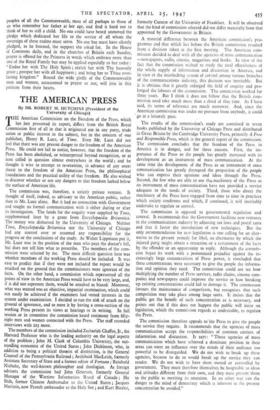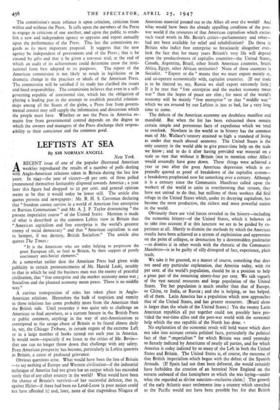THE AMERICAN PRESS
By DR. ROBERT M. HUTCHINS (President of the University of Chicago)
THE American Commission on the Freedom of the Press, which has just presented its report, differs from the British Royal Commission first of all in that it originated not in any party, trade union or public interest in the subject, but in the concern of one publisher, Henry R. Luce, of Time. Even Mr. Luce did not feel that there was any present danger to the freedom of the American Press. He could not fail to notice, however, that the freedom of the Press has been abolished, or reinterpreted- beyond recognition, or at least called in question almost everywhere in the world ; and he thought it wise to attempt to re-examine, in advance of any overt threat to the freedom of the American Press, the philosophical foundations and the practical utility of that freedom. He also wished to discover whether or not any dangers to that freedom lurked below the surface of American life.
The commission was, therefore, a strictly private venture. It thought of itself, indeed, as advisory to the American public, rather than to Mr. Luce alone. But it had no connection with Government and sought no formal• communication with it either during or after its investigation. The funds for the enquiry were supplied by Time, supplemented later by a grant from Encyclopaedia Britannica. The money was disbursed by the University of Chicago. Neither Time, Encyclopaedia Britannica nor the University of Chicago had any control over or assumed any responsibility for the progress or the conclusions of the study. As Walter Lippmann put it, Mr. Luce was in the position of the man who pays the doctor's bill, but does not tell him what to prescribe. The members of the com- mission were selected by me. The most difficult question here was whether members of the working Press should be included. It was easy to predict that if they were not included the report would be attacked on the ground that the commissioners were ignorant of the facts. On the other hand, a commission which represented all the points of view in the American Press would have to be very large, and, if it did not represent them, would be attacked as biased. Moreover, what was wanted was an objective, impartial examination, which could not easily be achieved if the examiners had vested interests in the system under examination. I decided to run the risk of attack on the ground of ignorance, and to meet it by having a cross-section of the working Press present its views at hearings or in writing. In full session or in committee the commission heard testimony from fifty- eight men and women connected with the Press. The staff recorded interviews with 225 more.
The members of the commission included Zechariah Chaffee, Jr., the Harvard Professor who is the leading authority on the legal aspects of the problem ; John M. Clark of Columbia University, the out- standing economist of the United States ; John Dickinson, who, in addition to being a political theorist of distinction, is the General Counsel of the Pennsylvania Railroad ; Archibald MacLeish, formerly Assistant Secretary of State and a former editor of Fortune ; Reinhold Niebuhr, the well-known philosopher and theologian. As foreign advisers the commission had John Grierson, formerly General Manager of the Wartime Information Board of Canada ; Hu Shih, former Chinese Ambassador to the United States ; Jacques Maritain, now French ambassador to the Holy See ; and Kurt Riezler, formerly Curator of the University of Frankfurt. It will be observed that the kind of commission selected did not differ materially from that appointed by the Government in Britain.
A material difference between the American commission's pro- gramme and that which lies before the British commission resulted from a decision taken at the first meeting. The American com- mission decided to deal with all the agencies of mass communication —newspapers, radio, cinema, magazines and books. In view of the fact that the commission wished to study the total effectiveness of the whole supply of information and. discussion in America, and in view of the interlocking system of control among various branches of the communications industry, this decision was inevitable. But it is obvious that it greatly enlarged the field of enquiry and pro- longed the labours of the commission. The commission worked for three years. But I think it does not follow that the British com- mission need take much more than a third of that tame. As I have said, its terms of reference are much narrower. And, since the American commission was under no pressure from anybody, it could • go at a leisurely pace.
The results of the commission's study are contained in seven books published by the University of Chicago Press and distributed in Great Britain by the Cambridge University Press, primarily A Free and Responsible Press, which is the general report of the commission. The commission .concludes that the freedom of the Press in America is in danger, and for three reasons. First, the im- portance of the Press to the people has greatly increased with its development as an instrument of mass communication. At the same time the development of the Press as an instrument of mass communication has greatly decreased the proportion of the people who can express their opinions and ideas through the Press. Second, the few who are able to use the, machinery of the Press as an instrument of mass communication have not provided a service adequate to the needs of society. Third, those who direct the machinery of the Press have engaged from time to time in practices which society condemns and which, if continued, it will inevitably undertake to regulate or control.
The commission is opposed to governmental regulation and control. It recommends that the Government facilitate new ventures in the communications industry by adjusting tax laws and postal rates and that it foster the introduction of new techniques. But the only recommendation for new legislation is one calling for an alter- native to the present remedy for libel, an alternative by which the injured party might obtain a retraction or a restatement of the facts by the offender or an opportunity to reply. Although the commts- sion began its work with a pronounced prejudice against the in- creasingly large concentrations of Press power, it concluded that these concentrations were necessary to give the people the informa- tion and opinion they need. The commission could not see how multiplying the number of Press services, radio chains, cinema com- panies and newspapers could improve the service or how breaking up existing concentrations could fail to damage it. The comnussion favours the maintenance of competition, but recognises that such competition may take place among large units. It insists that the public get the benefit of such concentration as is necessary, and points out that if this does not happen the public will insist on legislation, which the commission regards as undesirable, to regulate the Press.
The commission therefore appeals to' the Press to give the people the service they require. It recommends that the agencies of mass communication accept the responsibilities of common carriers of information and discussion. It says: " Those agencies of mass communication which have achieved a dominant position in their areas can exert an influence over the minds of their audience too powerful to be disregarded. We do not wish to break up these agencies, because to do so would break up the service they can render. We do not wish to have them owned or controlled by government. They must therefore themselves be hospitable to ideas and attitudes different from their own, and they must present them to the public as meriting its attention. In no other way can the danger to the mind of democracy which is inherent in the present concentration be avoided." The commission's main reliance is upon criticism, criticism from within and without the Press. It calls upon the members of the Press to engage in criticism of one another, and upon the public to estab- lish a new and independent agency to appraise and report annually upon the performance of the Press. This last the commission re- gards as its most important proposal. It suggests that the new agency be independent of government and of the Press ; that it be created by gifts and that it be given a ten-year trial, at the end of which an audit of its achievement could determine anew the insti- tutional form best adapted to its purposes. The report of the American commission is not likely to result in legislation or in dramatic change in the practices or ideals of the American Press. The commission will be satisfied if its study has clarified the issues and'fixed responsibility. The commission believes that even in a self= governing republic of continental size, which has the obligation of playing a leading part in the attempt to establish peaceful relation- ships among all the States of the globe, a Press free from govern- mental control may still supply the information and discussion which the people must have. Whether or not the Press in America re-. mains free from governmental control depends on the degree to which the owners and managers of the Press discharge their respon- sibility to their conscience and the common good.



































 Previous page
Previous page